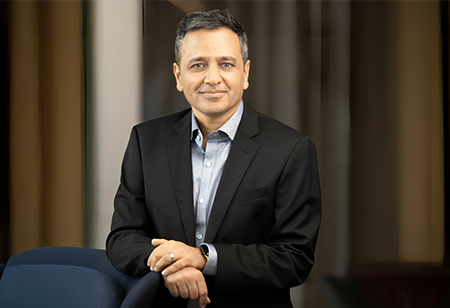
In an interaction with Industry Outlook, Manish Kothari, Senior Vice President, Silicon Labs, shares insights on how IoT initiatives support urban sustainability via products like smart lighting and metering. He emphasizes the company's assurance of data security and privacy, mentioning sophisticated encryption and compliance with world standards.
Manish is a distinguished technology leader specializing in semiconductor innovation, product development, and ecosystem strategy. With over 60 patents, he has pioneered advancements in connected devices, IoT systems, and scalable manufacturing.
How do you see the current trends in the IoT industry, particularly in relation to urban sustainability?
The street lighting system is a great example of how IoT can drive sustainability. For instance, at the IIT Hyderabad campus, the entire street lighting system operates on the WISEN network and includes our FG25 products. Once these systems are connected, they can be automatically turned on or off based on need, which directly contributes to energy efficiency.
IoT is the best way to improve the lives of people. In cities, it’s really amazing. If street lighting is deployed and is smart, you’ve built an infrastructure because it’s everywhere. On that, you can keep layering and adding a lot of things.
Smart metering is another key area. In India, 20–25 percent of electricity is wasted or stolen. That’s against sustainable smart metering initiatives. The Government of India is actively working to address this issue.
Also Read: How Technology and Sustainability Shape Modern Sports Gear
What are the ethical implications of using data collected from smart city sensors and how can privacy be protected?
Privacy is another concern, especially in smart cities, which involves data from security cameras and other sensors. For instance, we provide the most secure products in the market today, and our CS2 and FG25 solutions meet BSA Level 3 and Level 4 security standards respectively. However, product security doesn’t automatically guarantee application-level security.
We are doing our part by ensuring that our solution is the most secure. You can really encrypt a lot of the data, and we protect that. But we have to work with customers, and the people who are building have to keep that privacy concept up the value chain. I can’t control if somebody’s building a camera that’s deployed in retail space, what they do with it, what facial recognition they are doing, and whether they are keeping that data private is not something we do.
This is where the government gets involved. Europe has come up with its Cyber Resiliency Act, and governments are stepping in to enforce standards at the product level so that the security of data and privacy are maintained. But we are not waiting for that. We’ve always kept security as our priority.
What we provide is the most secure product. But we also need every stakeholder in the value chain to uphold that commitment because if someone transmits private data to the cloud and monetizes it, it’s beyond our control. We definitely pride ourselves on pushing for security and privacy, and I think it’s starting to change.
The future of IoT lies in connected infrastructure that enables smarter, safer, and more sustainable cities for generations to come
What are the key features and benefits of the Simplicity ecosystem for developers and end users?
The whole reason is because of the word Simplicity. The whole idea is we want to make it simple and easy to use, low touch for developers and students to build products and innovate on. That has been the whole idea, and Simplicity Studio v6 was a step in that journey.
Another step function is the Simplicity AI SDK that we just announced at the keynote earlier today. The idea is to provide the tooling, documentation, and SDK in a package that’s easy to use. Customers can focus and build their applications on our platform with ease. That’s really the motivation, and we’ve shown that with the Studio v6 announcement and the Simplicity AI announcement.
Also Read: Evolving Dynamics of EPC in the Global Chemical Industry
What is your vision for the future of IoT and smart city ecosystems?
The IoT revolution in cities has already begun, and I am quite optimistic about where it’s headed. Smart lighting, smart metering, and connected infrastructure are laying the foundation for intelligent, sustainable urban environments. Once this infrastructure is in place, additional layers from environmental monitoring to public safety can be seamlessly added.
In essence, IoT is not just improving the efficiency of city management; it’s transforming how people experience urban life. The foundation is being built today, and its potential will only expand as more layers of connectivity and intelligence are added over time.
We use cookies to ensure you get the best experience on our website. Read more...